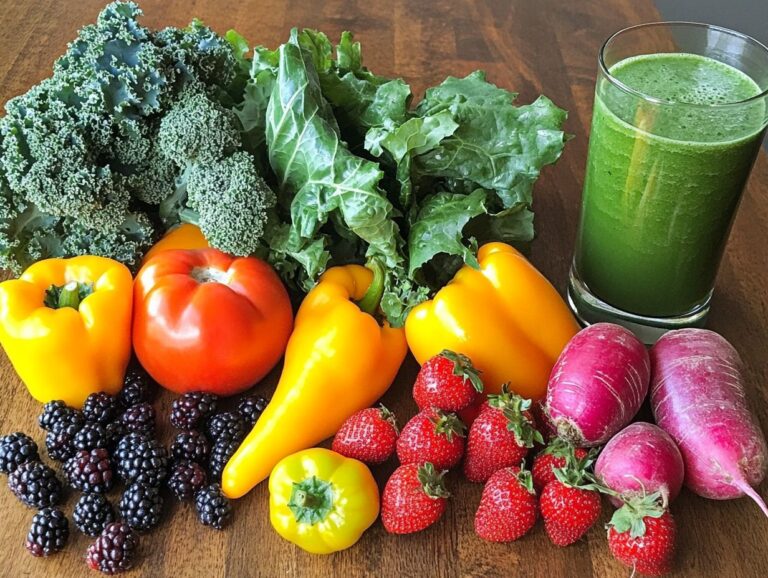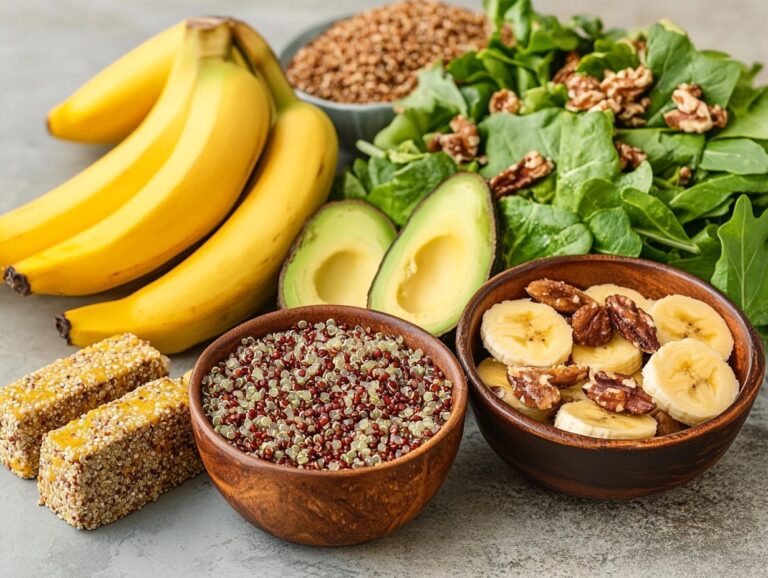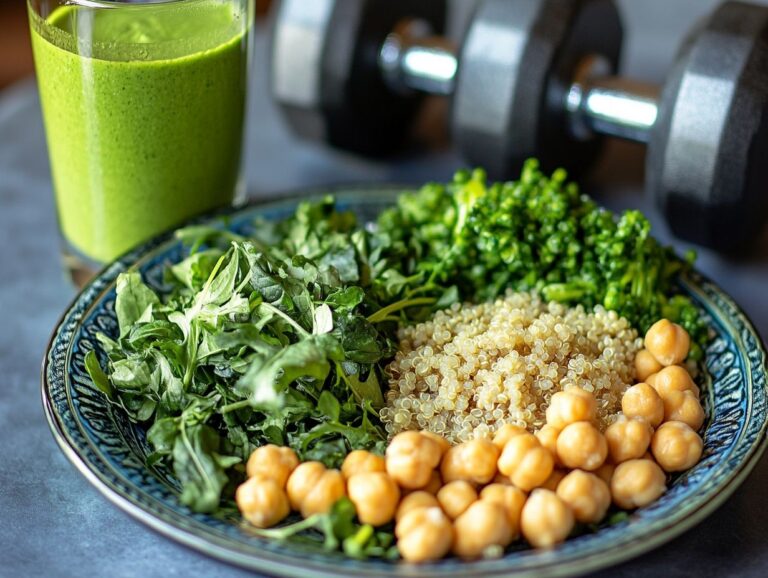Curious about how a vegan diet can impact mental health, particularly conditions like anxiety and depression? You’re not alone. More people are exploring plant-based lifestyles and veganism, and research suggests that what we eat plays a crucial role in emotional well-being. This article explores the fundamentals of a vegan diet, its benefits for anxiety, and how specific foods can support mental health. It also discusses how to transition smoothly to this lifestyle, empowering you to make choices that nurture both body and mind. Emphasizing a well-planned diet is crucial to avoid nutrient deficiencies such as vitamin B12 and omega-3 fatty acids.
Key Takeaways:
- A vegan diet can help reduce inflammation, improve gut health, and lower the risk of chronic diseases, all of which can contribute to anxiety.
- By providing essential nutrients for brain function and increasing the production of mood-boosting hormones, a vegan diet can support mental health.
- Including whole grains, legumes, fruits, vegetables, and nuts and seeds in a vegan diet can provide the necessary nutrients for managing anxiety symptoms.
What Is a Vegan Diet and Veganism?
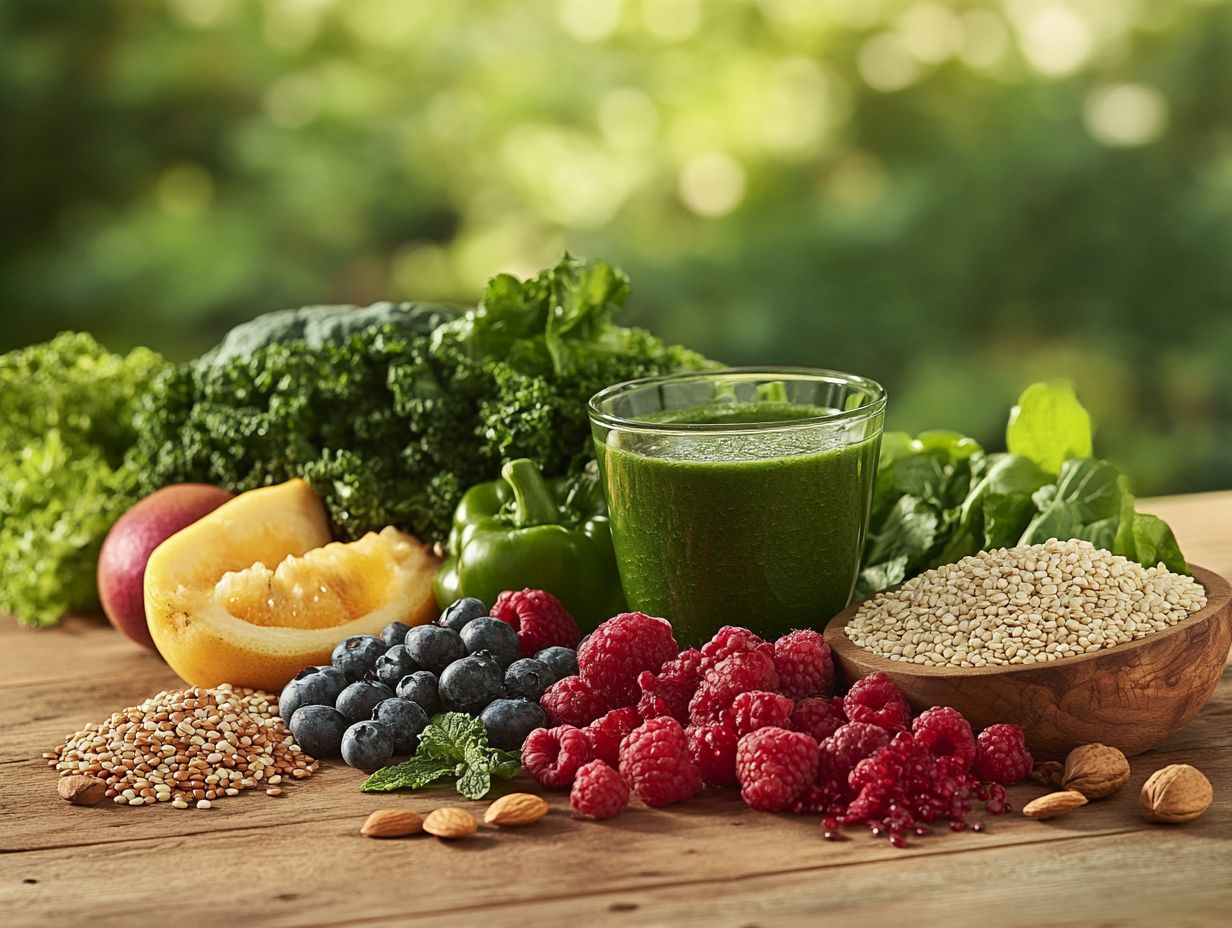 A vegan diet is a dietary pattern that excludes all animal products, including meat, dairy, and eggs, while primarily focusing on plant-based foods such as fruits, vegetables, legumes, grains, nuts, and seeds. This dietary pattern is also known as veganism. This dietary approach has gained popularity due to its potential health benefits, which may include improved heart health, a lower risk of chronic diseases like obesity and diabetes, and positive effects on mental well-being. By emphasizing a well-planned vegan diet that is rich in fiber, vitamins, and minerals, individuals can promote optimal health. It is also important to be mindful of potential nutrient deficiencies, such as vitamin B12, omega-3 fatty acids, and calcium, to ensure overall well-being.
A vegan diet is a dietary pattern that excludes all animal products, including meat, dairy, and eggs, while primarily focusing on plant-based foods such as fruits, vegetables, legumes, grains, nuts, and seeds. This dietary pattern is also known as veganism. This dietary approach has gained popularity due to its potential health benefits, which may include improved heart health, a lower risk of chronic diseases like obesity and diabetes, and positive effects on mental well-being. By emphasizing a well-planned vegan diet that is rich in fiber, vitamins, and minerals, individuals can promote optimal health. It is also important to be mindful of potential nutrient deficiencies, such as vitamin B12, omega-3 fatty acids, and calcium, to ensure overall well-being.
What Are the Benefits of a Vegan Diet for Anxiety?
A vegan diet offers numerous benefits that can positively impact mental health, particularly for those experiencing anxiety and depression. This plant-based diet, rich in nutrients and antioxidants such as vitamin C and magnesium, can help alleviate anxiety symptoms while reducing the risk of chronic diseases and enhancing overall emotional well-being. The diverse range of healthy foods found in a vegan diet helps prevent nutritional deficiencies that could exacerbate anxiety, contributing to a more balanced and effective approach to treating anxiety-related disorders. Including a daily multivitamin may also help address potential gaps in nutrient intake.
1. Reduces Inflammation
Vegan diets can reduce inflammation levels in the human body, thereby lowering the risk of chronic diseases such as heart disease, diabetes, and arthritis. This is largely due to the high nutrient density of a vegan diet, which is rich in anti-inflammatory compounds and antioxidants found in fruits, vegetables, whole grains, and legumes. Additionally, a vegan diet includes sources of omega-3 fatty acids, often found in flaxseeds and walnuts, which further enhance its anti-inflammatory benefits. Research has shown that certain plant-based foods, such as berries, turmeric, and leafy green vegetables, contain bioactive compounds that help lower inflammatory markers. These foods also offer essential vitamins like vitamin E and zinc, which support overall health. For example, berries are rich in flavonoids that can reduce levels of C-reactive protein (CRP), a commonly measured inflammatory marker in humans. Turmeric, on the other hand, is a powerful anti-inflammatory herb containing curcumin, which has been shown to inhibit multiple inflammatory pathways. Moreover, a balanced vegan diet can improve gut health by increasing dietary fiber intake, which may lead to a more diverse microbiome. This diversity can result in lower inflammation levels and better overall health outcomes. Adopting a vegan lifestyle may not only reduce inflammation but also decrease the risk of diseases commonly associated with chronic inflammation, such as high blood pressure and certain psychological disorders.
2. Improves Gut Health
A vegan diet is beneficial for gut health due to its high fiber content, which supports healthy digestion, reduces the risk of constipation, and encourages a diverse microbiome. The abundance of fruits, vegetables, whole grains, and legumes in a plant-based diet provides essential prebiotics that nourish beneficial gut bacteria. Additionally, incorporating foods like nutritional yeast can enhance nutrient intake. By promoting gut health through a vegan diet, individuals can alleviate issues such as constipation and reduce the risk of gastrointestinal diseases, while also enhancing nutrient absorption and minimizing the likelihood of nutritional deficiencies, such as those related to iron and folic acid. Improved gut health positively influences mental well-being, as the gut microbiome produces neurotransmitters that affect mood and cognition. The synergistic effects of fiber-rich foods and prebiotics help reduce inflammation, particularly in the gut, leading to better nutrient availability and a lower risk of chronic conditions such as anxiety and depression.
3. Increases Intake of Nutrient-Dense Foods
One of the primary benefits of a vegan diet is the increased likelihood of consuming nutrient-dense foods that provide essential vitamins and minerals for overall health. This diet can be particularly rich in nutrients like vitamin C, magnesium, iron, and folic acid. A well-planned vegan diet typically includes a variety of fruits, vegetables, legumes, nuts, and whole grains, all of which are rich sources of vital nutrients such as vitamin C, magnesium, iron, and folic acid. By focusing on these healthy foods, individuals are more likely to enhance their daily intake of essential nutrients while reducing their risk of nutritional deficiencies, thereby positively impacting both their physical and mental well-being. Including a daily multivitamin can further ensure adequate nutrient intake.
4. Lowers Risk of Chronic Diseases
Research indicates that following a vegan diet can reduce the risk of chronic diseases such as obesity, diabetes, and heart disease, thereby promoting long-term health and well-being. The LIPOKAP study among Iranian adults supports these findings, showing improvements in dietary index and health status. The emphasis on whole, plant-based foods in a vegan diet is associated with lower saturated fat intake and a higher intake of beneficial nutrients. This dietary choice leads to improved metabolic health and better weight control, significantly lowering the risk of these common ailments. A dietary intake assessment can help ensure a balanced meal plan that meets all nutritional needs. Numerous studies support this connection; for instance, a large meta-analysis published in the Journal of the American Heart Association found that individuals on a vegan diet have a 32% lower risk of heart disease. Additionally, research from the American Diabetes Association found that plant-based diets can significantly reduce blood sugar levels and improve insulin sensitivity, leading to an average risk reduction of 34% for type 2 diabetes. These health benefits highlight the importance of a well-balanced dietary pattern. The inclusion of fruits, vegetables, legumes, and whole grains plays a crucial role in enhancing nutrient intake, creating an environment in the body that is less conducive to the development of chronic diseases.
How Does a Vegan Diet Support Mental Health?
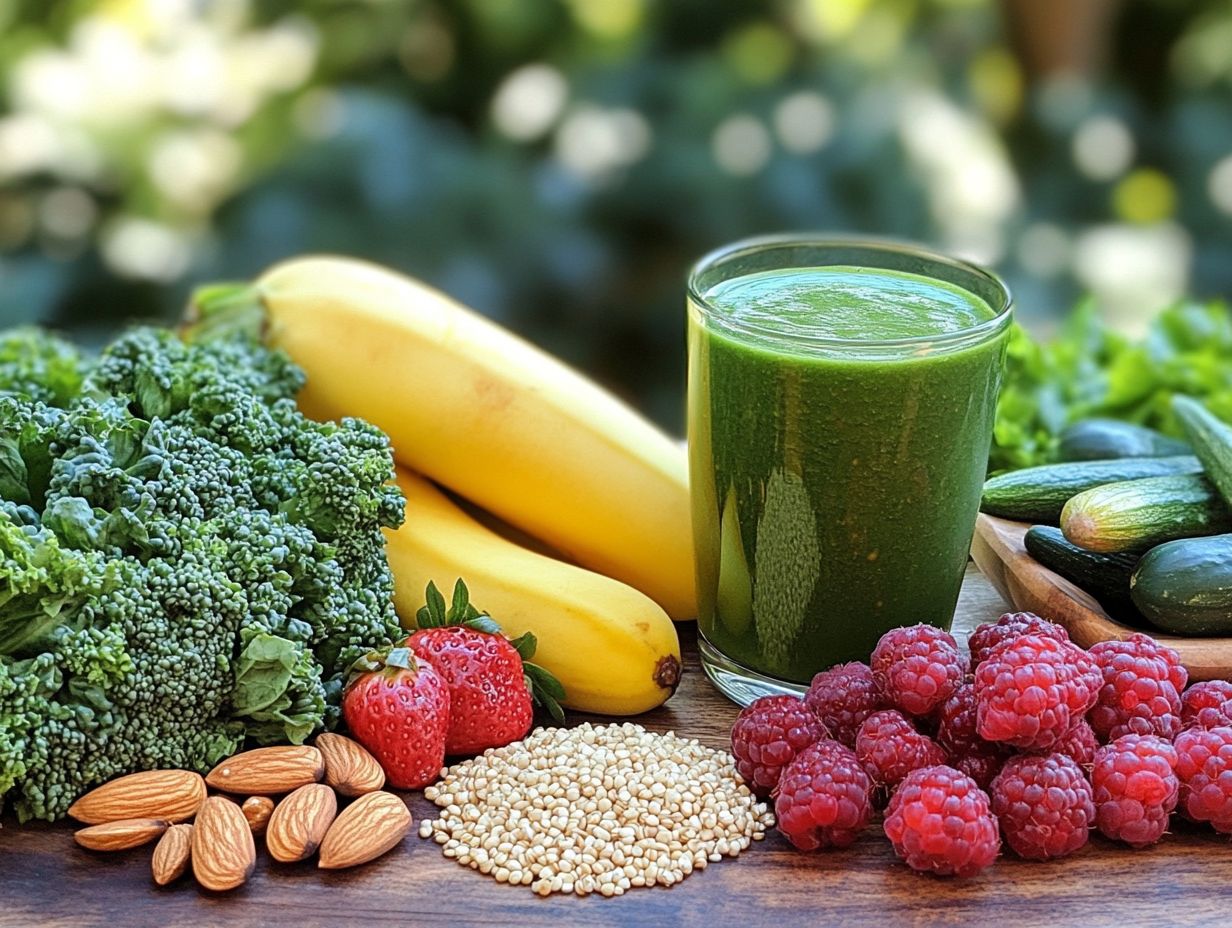 A vegan diet can significantly influence mental health by serving as a natural treatment for depression and anxiety while enhancing overall psychological well-being. The Hospital Anxiety and Depression Scale can be used to measure improvements in these conditions. By focusing on nutrient-dense plant-based foods, this diet supports cognitive function through essential nutrients and helps alleviate symptoms of mental health disorders by ensuring an adequate intake of vitamins, minerals, and healthy fats. Including plant proteins, such as those found in legumes and nuts, also supports overall health.
A vegan diet can significantly influence mental health by serving as a natural treatment for depression and anxiety while enhancing overall psychological well-being. The Hospital Anxiety and Depression Scale can be used to measure improvements in these conditions. By focusing on nutrient-dense plant-based foods, this diet supports cognitive function through essential nutrients and helps alleviate symptoms of mental health disorders by ensuring an adequate intake of vitamins, minerals, and healthy fats. Including plant proteins, such as those found in legumes and nuts, also supports overall health.
1. Provides Essential Nutrients for Brain Function
A balanced vegan diet provides the essential nutrients necessary for proper brain function, which is vital for maintaining mental health. Nutrients such as omega-3 fatty acids, vitamin B12, folic acid, iron, and magnesium play significant roles in cognitive performance and emotional regulation. A well-rounded vegan diet that includes healthy plant proteins, green leafy vegetables, nuts, and fortified foods ensures that these nutrients are readily available to the brain, thus supporting better mental health. Additionally, antioxidants found in fruits and vegetables protect brain cells from oxidative stress and may help prevent cognitive decline. Foods rich in iron, such as lentils and chickpeas, facilitate oxygen transport in the bloodstream and enhance overall brain function. Ensuring adequate intake of calcium and zinc also supports overall health. Staying properly hydrated is also crucial, as dehydration can negatively affect concentration and mood. Therefore, a diverse and well-balanced vegan diet can promote improved cognition and emotional well-being.
2. Increases Production of Mood-Boosting Hormones
Veganism can play a significant role in producing mood-enhancing hormones, such as serotonin, which is essential for regulating mood and emotional well-being. Diets rich in folic acid found in legumes, leafy greens, and fortified grains help maintain hormonal balance and support emotional health. By prioritizing nutrient-dense plant foods, individuals are more likely to experience improved mood and reduced symptoms of emotional eating and anxiety. Research indicates that certain phytochemicals commonly found in plant-based diets, such as flavonoids and polyphenols, can contribute to emotional stability by modulating neurotransmitter activity. Incorporating a daily multivitamin can further enhance nutrient intake and mood effects. Studies suggest that individuals following a vegan lifestyle report lower levels of stress and anxiety, likely due to the higher intake of omega-3 fatty acids found in flaxseeds and chia seeds. A well-balanced vegan diet can also reduce bodily inflammation associated with depressive symptoms, highlighting the important connection between nutrition and mental health. The LIPOKAP study among Iranian adults further supports these findings. Ultimately, adopting a plant-based lifestyle offers not only physical benefits but also psychological advantages, leading to an overall happier outlook on life.
3. Reduces Symptoms of Depression and Anxiety
A vegan diet may alleviate symptoms of depression and anxiety, suggesting its potential as a natural treatment for these psychiatric conditions. The high concentration of antioxidants and anti-inflammatory compounds found in plant-based foods can positively influence mood and emotional well-being. A community trial utilizing a dietary index and food frequency questionnaire can help assess the effectiveness of these dietary patterns in managing psychological disorders. By improving dietary quality and ensuring adequate nutrient intake, individuals may be able to relieve the debilitating symptoms of depression and anxiety, thereby enhancing their overall quality of life. This correlation may be attributed to several key aspects of a vegan lifestyle and well-planned diet. Plant-based diets are typically centered around whole foods and are rich in fiber, vitamins, and minerals that are essential for brain function and hormone balance. Certain nutrients, such as omega-3 fatty acids found in flaxseeds and walnuts, are vital for the synthesis of neurotransmitters. Additionally, a daily multivitamin can help ensure adequate nutrient intake, including vitamin B12, which is crucial for vegans. Additionally, a lower intake of processed foods may lead to fewer mood fluctuations and greater emotional stability, while also promoting a healthy gut microbiome, which has been linked to improved mental health. Avoiding unhealthy dietary patterns, such as consuming saturated fats, can further support mental well-being. By making mindful food choices, individuals can support their pursuit of better emotional health and reduce the risk of chronic diseases such as heart disease and diabetes.
4. Promotes Mindful Eating
A vegan diet encourages mindful eating practices that can positively impact mental health by fostering a more conscious relationship with food. By prioritizing nutrient-dense, whole foods, individuals are motivated to slow down and savor their meals, which can help reduce patterns of emotional eating. This mindful approach enhances the enjoyment of food and is associated with various health benefits, including improved mental health and cognitive function. Engaging with the flavors, textures, and colors of plant-based meals allows individuals to fully experience their meals using all their senses. By slowing down the eating process, it becomes easier to recognize hunger signals and emotional triggers, while also cultivating gratitude for the food itself. Meal prepping with whole grains, fruits, and vegetables, along with dining in a calm environment, can further enhance the mindful eating experience, leading to healthier relationships with both food and oneself.
What Foods Should Be Included in a Vegan Diet for Anxiety?
Healthy foods for managing anxiety within a vegan diet consist of items that, when included in a balanced plant-based meal plan, provide essential nutrients for mental health. Foods rich in magnesium, calcium, and zinc can be particularly beneficial in this regard. By incorporating the right foods for anxiety, individuals can ensure they receive adequate amounts of vitamins, minerals, and amino acids that support emotional well-being. Including foods fortified with nutritional yeast can help meet vitamin B12 needs, which is often a concern for those on a vegan diet. Including these foods in a vegan diet can help individuals obtain the necessary nutrients to alleviate anxiety symptoms and prevent potential nutrient deficiencies that could exacerbate mental health issues.
1. Whole Grains
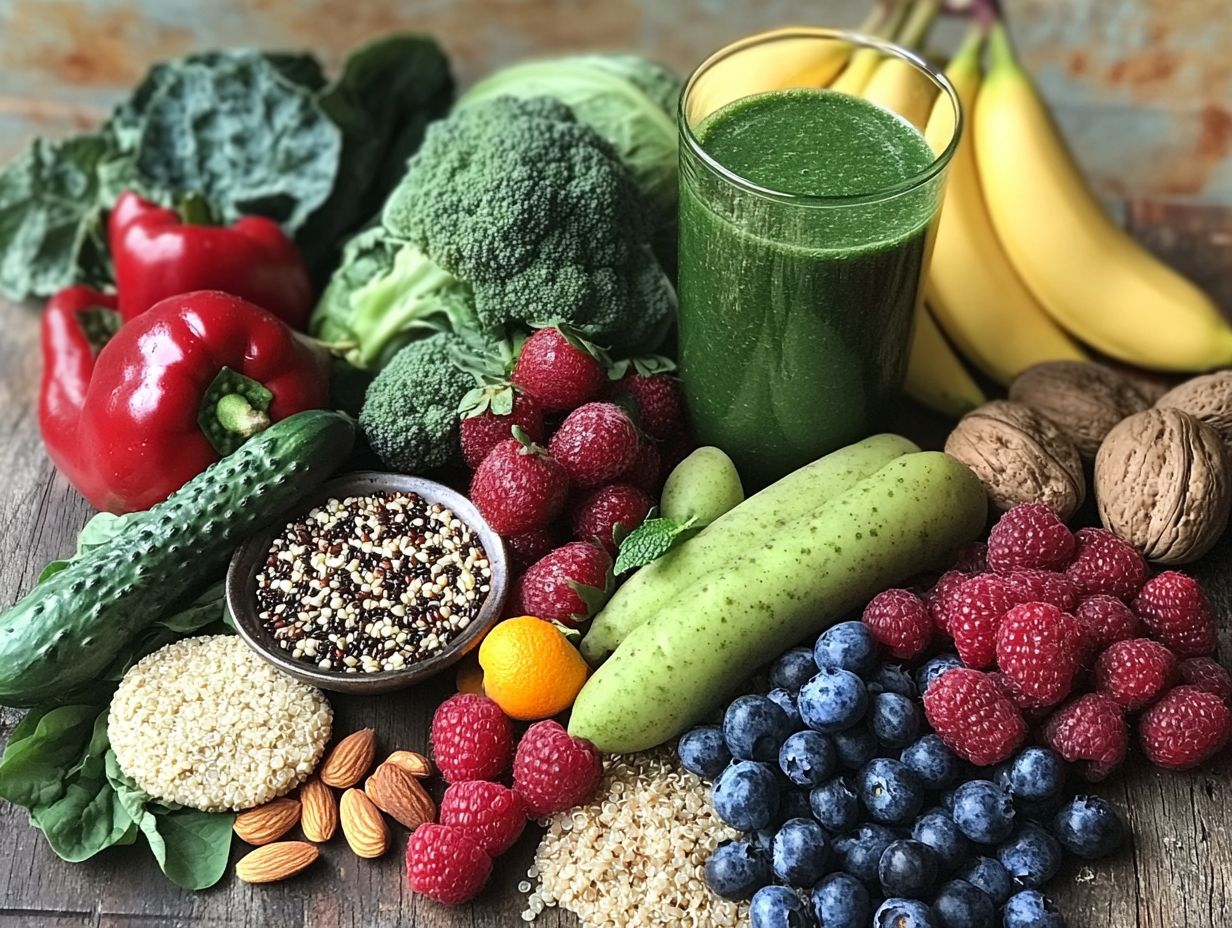 Whole grains are an essential component of a vegan diet, offering nutrients that significantly contribute to mental health and overall well-being. They enhance mood and cognitive function and serve as a rich source of complex carbohydrates, which help stabilize serotonin levels. Incorporating a variety of whole grains into one’s diet can prevent nutritional deficiencies and support long-term health. For instance, incorporating barley, bulgur, or whole wheat into salads, soups, and breakfast bowls can create nutritious and wholesome meals. Additionally, whole grains provide important fibers that support digestion and promote a healthy gut microbiome. Choosing whole grains is a positive step towards achieving a balanced lifestyle that prioritizes both mental and physical health.
Whole grains are an essential component of a vegan diet, offering nutrients that significantly contribute to mental health and overall well-being. They enhance mood and cognitive function and serve as a rich source of complex carbohydrates, which help stabilize serotonin levels. Incorporating a variety of whole grains into one’s diet can prevent nutritional deficiencies and support long-term health. For instance, incorporating barley, bulgur, or whole wheat into salads, soups, and breakfast bowls can create nutritious and wholesome meals. Additionally, whole grains provide important fibers that support digestion and promote a healthy gut microbiome. Choosing whole grains is a positive step towards achieving a balanced lifestyle that prioritizes both mental and physical health.
2. Legumes
Legumes are a vital source of plant proteins and essential nutrients that are important for a vegan diet aimed at reducing anxiety. Foods such as lentils, chickpeas, and black beans are rich in iron, folic acid, and fiber, all of which contribute to emotional stabilization and overall well-being. Regular consumption of legumes can also aid in the prevention of chronic diseases such as obesity and arthritis. Regularly consuming legumes can help individuals meet their nutritional needs, potentially alleviating anxiety. Along with being a robust source of protein, legumes are also packed with antioxidants that enhance brain function and mood regulation. For instance, omega-3 fatty acids found in certain varieties may improve cognitive functioning, promoting a balanced state of mind. Furthermore, legumes can support the management of blood pressure and reduce the risk of heart disease. Furthermore, legumes are low in fat and help maintain steady blood glucose levels, which are crucial for emotional health. Incorporating a diverse range of legumes into one s diet allows individuals to enjoy a variety of delicious dishes while reaping both mental and physical benefits. This diverse dietary intake can also help prevent deficiencies in essential nutrients like vitamin B12, which is crucial for nerve function and mental health.
3. Fruits and Vegetables
Fruits and vegetables are fundamental components of a vegan diet, providing a wide array of vitamins, minerals, and antioxidants essential for mental health and overall well-being. The high levels of vitamin C and other nutrients found in these foods aid the body in combating stress and anxiety. Ensuring a colorful variety in dietary intake can prevent nutrient deficiencies and support robust health. Research suggests that incorporating a diverse selection of colorful fruits and vegetables into their diet can help vegans reduce emotional eating and enhance their mood. Leafy greens, such as kale and spinach, are significant sources of folate, which plays a vital role in mood regulation and depression prevention. Additionally, berries are rich in antioxidants that can boost memory function, helping vegans remain alert and focused. This can also mitigate the risk of psychological disorders by maintaining a well-balanced dietary intake. Simple ways to increase the intake of plant-based fruits and vegetables include:
- Adding a piece of fruit to breakfast cereals,
- Blending green vegetables into smoothies,
- Experimenting with vegetable stir-fries.
By doing so, anyone can enjoy the mood-boosting benefits of these nutritious foods while savoring their delicious flavors.
4. Nuts and Seeds
Nuts and seeds are excellent components of a vegan diet, as they provide healthy fats, protein, and essential nutrients that contribute to mental well-being. Varieties such as walnuts, flaxseeds, and chia seeds are particularly beneficial because they are rich in omega-3 fatty acids, which support brain function and help regulate emotions. These foods also offer significant health benefits, including reducing inflammation and supporting heart health. Incorporating nuts and seeds into a vegan diet enhances nutrient intake and can alleviate symptoms of anxiety. These small yet powerful foods can easily be added to meals and offer numerous health benefits. For instance, they can help manage nutritional deficiencies and provide essential nutrients like zinc and vitamin E, which are important for mental health. For instance, almonds are a great source of vitamin E, an antioxidant that helps reduce oxidative stress in the brain, while pumpkin seeds are high in magnesium, which has been associated with improved mood and decreased feelings of anxiety. Including these foods as part of a daily meal plan can optimize dietary patterns and enhance mental well-being. A simple way to enjoy these benefits is by adding nuts and seeds to smoothies, salads, or energy bars. The versatility of nuts and seeds allows for easy incorporation into meals without sacrificing the advantages of a plant-based diet; for example, you can sprinkle chia seeds on yogurt or stir hemp seeds into soups. This can also help maintain a balanced nutrient intake, preventing potential deficiencies and supporting overall health.
What Foods Should Be Avoided in a Vegan Diet for Anxiety?
To maximize the mental health benefits of a vegan diet for anxiety, certain foods should be excluded. Processed foods that contain added sugars and artificial ingredients should be avoided, as they are often nutritionally empty and lack essential nutrients that individuals with mood disorders typically need. Avoiding these foods can help prevent nutrient deficiencies that may contribute to anxiety and other psychological disorders. For example, deficiencies in specific B vitamins, magnesium, and iron have been linked to anxiety, and processed products can exacerbate these deficiencies. When such deficiencies occur, anxiety and other mood disorders may worsen.
1. Processed Foods
Processed foods often contain large amounts of unhealthy fats, sugars, and additives, which can be detrimental to mental health and particularly challenging for those who struggle with anxiety. These foods can lead to unstable blood sugar levels, contributing to feelings of tiredness and irritability. By steering clear of processed foods, individuals can avoid nutritional deficiencies and foster more stable moods and emotions. Foods high in preservatives such as packaged snacks, certain breakfast cereals, and ready-to-eat meals can exacerbate anxiety symptoms. Opting for whole, unprocessed foods supports better mental health and reduces the risk of chronic diseases like diabetes and heart disease. The lack of essential nutrients, such as omega-3 fatty acids, vitamins, and minerals found in whole foods, can further contribute to unstable moods and cognitive difficulties. For example, a high consumption of sodas and fast foods can cause inflammation in the body, which studies have linked to mood disorders. Conversely, a diet rich in whole grains, fruits, vegetables, and lean proteins can enhance serotonin levels, promoting a greater sense of well-being and emotional stability. Including a diverse range of plant-based proteins, such as legumes and nuts, ensures a well-rounded dietary intake that supports overall health.
2. Added Sugars
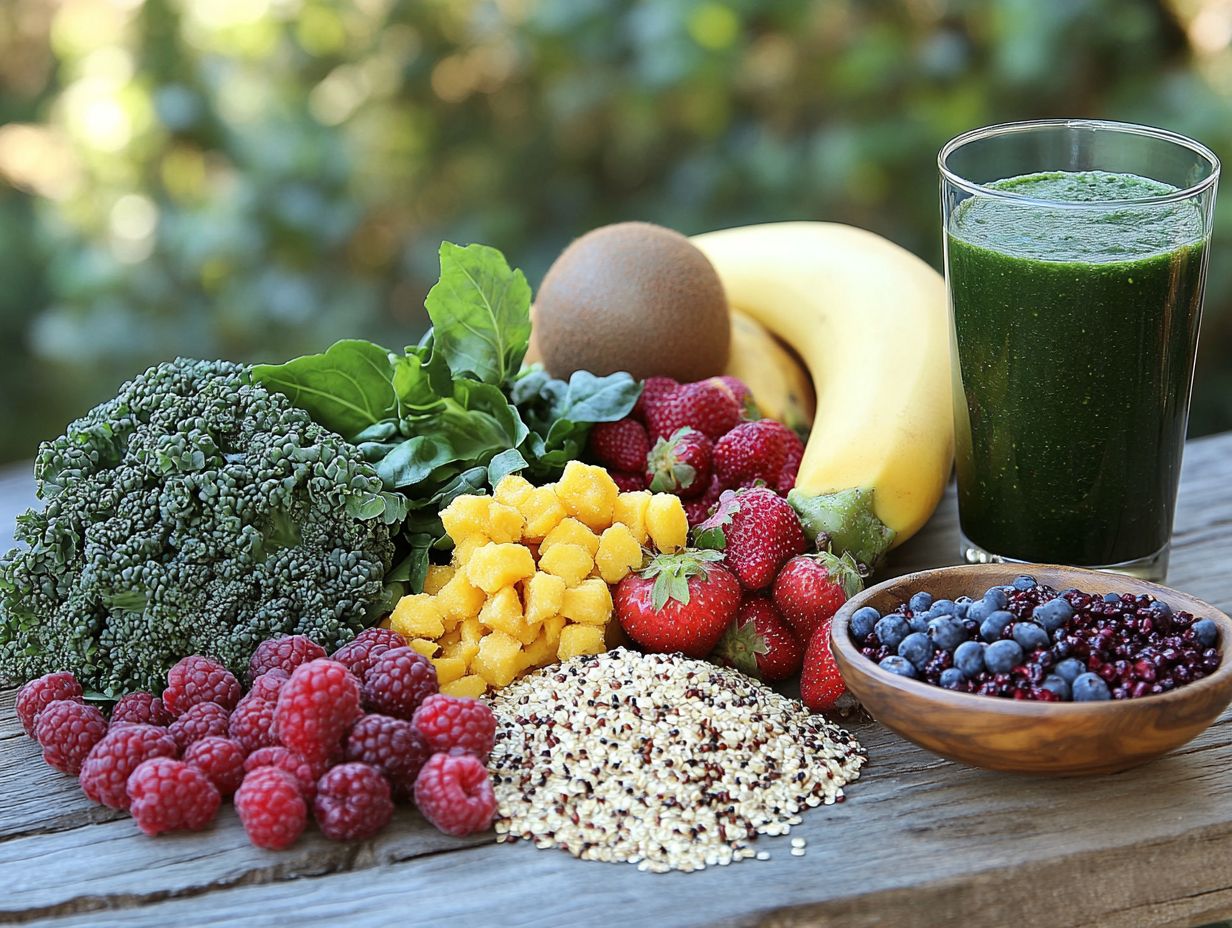 Added sugars can have a detrimental effect on mental health, leading to mood swings and emotional eating. For those following a vegan diet, it is crucial to avoid added sugars, as they are present in many foods and beverages that can result in energy crashes and exacerbate anxiety symptoms. Reducing the intake of these sugars can also prevent chronic health conditions such as obesity and diabetes. Steering clear of added sugars contributes to a more stable mood and improved emotional well-being. However, recognizing added sugars in various products can be challenging, as they are listed under numerous names, including high fructose corn syrup and agave nectar. Practicing mindfulness involves closely examining nutrition labels and prioritizing whole, unprocessed foods that contain naturally occurring sugars, such as fruits and vegetables. Incorporating healthy fats and proteins into meals can help maintain stable blood sugar levels and reduce cravings for sugary snacks. Mindfulness not only positively influences mental health but also fosters a healthier relationship with food within a vegan diet. This approach can help identify emotional eating patterns and promote a balanced dietary intake, leading to improved overall health.
Added sugars can have a detrimental effect on mental health, leading to mood swings and emotional eating. For those following a vegan diet, it is crucial to avoid added sugars, as they are present in many foods and beverages that can result in energy crashes and exacerbate anxiety symptoms. Reducing the intake of these sugars can also prevent chronic health conditions such as obesity and diabetes. Steering clear of added sugars contributes to a more stable mood and improved emotional well-being. However, recognizing added sugars in various products can be challenging, as they are listed under numerous names, including high fructose corn syrup and agave nectar. Practicing mindfulness involves closely examining nutrition labels and prioritizing whole, unprocessed foods that contain naturally occurring sugars, such as fruits and vegetables. Incorporating healthy fats and proteins into meals can help maintain stable blood sugar levels and reduce cravings for sugary snacks. Mindfulness not only positively influences mental health but also fosters a healthier relationship with food within a vegan diet. This approach can help identify emotional eating patterns and promote a balanced dietary intake, leading to improved overall health.
3. Artificial Ingredients
Artificial ingredients, commonly found in processed foods, can have a detrimental effect on mental health and should be eliminated from a vegan diet. These additives can contribute to anxiety and disrupt the body’s natural biochemical processes. Research indicates that various synthetic additives, including artificial sweeteners, colorings, and preservatives, can interfere with neurotransmitter function and lead to mood changes. For instance, food colorings like Red 40 and Yellow 5 have been linked to hyperactivity and increased anxiety in some studies. Avoiding these additives can support a more stable mental health status and reduce the risk of nutrient deficiencies. Instead, consuming whole foods such as fruits, vegetables, legumes, nuts, and whole grains that are rich in nutrients like fiber, folic acid, magnesium, and free from chemical additives allows individuals to nourish both their bodies and minds more effectively. Foods in their natural form can enhance mood regulation, mental clarity, and resilience, contributing to reduced anxiety and depression.
How to Transition to a Vegan Diet for Anxiety?
Transitioning to a vegan diet can positively impact mental health by improving mood effects and acting as a potential treatment for depression. It aids in anxiety management, but it requires careful planning and gradual changes to avoid nutrient deficiencies. Developing a personalized meal plan that incorporates a variety of nutritious foods is essential, as it ensures that nutritional needs, including vitamin B12, omega-3 fatty acids, calcium, zinc, and plant proteins, are met while fostering healthier eating habits and potentially reducing the risk of chronic diseases such as heart disease, obesity, and diabetes. This approach can help reduce emotional eating, improve dietary patterns, and promote an overall balanced lifestyle that supports mental health and reduces the risk of psychological disorders.
1. Start Slowly
When transitioning to a vegan diet, it is important to take it slow and make small changes. This approach will help you adjust your dietary habits effectively, ensuring adequate nutrient intake and avoiding nutritional deficiencies, and ensure that you can maintain these changes in the long term. A practical way to ease into this new lifestyle is to replace one meal at a time and gradually incorporate a wider variety of healthy foods. This method minimizes the risk of nutritional deficiencies and makes it easier to adapt to the new meal patterns. Taking the time to learn about plant-based nutrition sets you up for greater success and enjoyment in the long run. For instance, someone transitioning to a vegan diet might start with simple substitutions, such as opting for almond milk instead of dairy or using chickpeas in place of meat in specific recipes. Journaling about your meals and how you feel during this transition can also be beneficial. It allows you to identify the best strategies for achieving a healthy diet and discovering what works best for you. Additionally, emphasizing seasonal produce is an effective way to enhance meal variety while improving both nutrition and flavor, contributing to a well-planned diet that supports a healthy lifestyle.
2. Educate Yourself on Plant-Based Nutrition
Learning about plant-based nutrition is essential for a successful transition to a vegan diet. It is important to understand one s nutritional needs to avoid potential deficiencies. By identifying the most important nutrients and their sources, individuals can ensure that they are nourishing their bodies adequately. This knowledge will enable them to incorporate a wider variety of healthy foods into their diets. Knowing where to obtain these nutrients is equally crucial. For instance, vitamin B12, important for maintaining healthy nerve and red blood cells, is primarily found in animal products, so it must be supplemented or obtained through fortified foods like nutritional yeast, which is popular in vegan diets. Omega-3 fatty acids are present in flaxseeds, chia seeds, and walnuts, while iron can be sourced from legumes, lentils, and dark leafy greens; these nutrients are crucial for minimizing the risk of anemia and maintaining overall health. By recognizing these plant-friendly sources, individuals can make better dietary choices that are balanced and fulfilling. This understanding will help reduce the risk of deficiencies and support overall health. Ultimately, knowledge of plant-based nutrition is vital for maintaining health and fostering a more sustainable lifestyle.
3. Experiment with New Recipes
Experimenting with new recipes is an enjoyable way to expand a vegan diet, allowing individuals to discover healthy foods and flavors while helping to manage anxiety. A variety of ingredients and preparation methods keeps meals interesting and satisfying, which can help counter emotional eating. Being creative in the kitchen fosters a positive relationship with food and contributes to a well-planned meal strategy. Exploring different vegan recipes not only opens up a world of flavors but also inspires creativity in meal preparation. Searching for diverse cooking styles and ingredients through cookbooks, online blogs, or social media platforms focused on plant-based dining can be incredibly fulfilling. Discovering unique combinations, seasonal produce, or themed meal nights can add excitement while promoting balanced nutrition. Sharing these recipes with friends or family helps build a sense of community, making meals more enjoyable and less solitary. Emphasizing the importance of variety in a vegan diet ensures healthier and more satisfying meal experiences.
4. Seek Support from a Registered Dietitian
Seeking support from a registered dietitian can significantly enhance the transition to a vegan diet, particularly for individuals who are concerned about nutritional balance, experience anxiety related to dietary changes, or are undergoing a community trial to assess the impact of dietary changes on health conditions. A dietitian can create personalized meal plans, identify potential nutritional deficiencies, and offer guidance on healthy food choices that promote overall well-being. This professional support is essential for addressing emotional eating and establishing a balanced plant-based lifestyle. By tailoring advice to an individual’s preferences and lifestyle, a dietitian can make the shift toward a vegan diet both enjoyable and fulfilling. The dietitian can incorporate a variety of whole foods, including:
- Legumes
- Whole grains
- Fruits
- Vegetables
ensuring an adequate intake of essential nutrients such as protein, iron, and vitamin B12. Additionally, the dietitian can assist in navigating social situations, such as dining out or attending gatherings, to ease the transition. Regular meetings provide ongoing support and accountability, making the move to a vegan diet a feasible and enriching endeavor that fosters long-term health.

